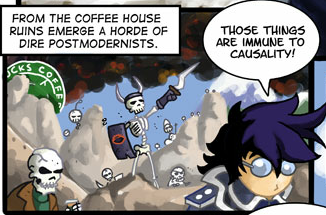I hope you’re all already familiar with Dresden Codak’s Dungeons and Discourse and Advanced Dungeons and Discourse, which basically make philosophy jokes in a DnD setting. (These two comics are the source of the above image).
It turns out that Scott, the guy whose post I was recommending in “The (Epistemic) Floor is Made of Lava,” wrote up a plot and songs for a philosophy based DnD campaign. It reminds me strongly of The Phantom Tollbooth. That means his players are facing down Hobbesgoblins and dealing with conundrums like this:
Xar-Morgoloth turns out to be a pleasant town of white-washed fences and laughing children. In search of an explanation for the incongruity the five seek out the town’s spiritual leader, the Priest of Lies. The Priest explains that although Xar-Morgoloth is superficially a nice place, the town is evil by definition. He argues that all moral explanations must be grounded in base moral facts that cannot be explained, whether these be respect for others, preference of pleasure over pain, or simple convictions that murder and theft are wrong. One of these base level moral facts, he says, is that Xar-Morgoloth is evil. It is so evil, in fact, that it is a moral imperative to keep people out of the city – which is why he sent assassins to scare them off.
Doubtful, the party seeks the mysterious visiting philosopher whom the Priest claimed originated these ideas: they find Immanuel Kant living alone on the outskirts of the city. Kant tells his story: he came from a parallel universe, but one day a glowing portal appeared in the sky, flinging him into the caves beyond Xar-Morgoloth. Wandering into Xar-Morgoloth, he tried to convince the citizens of his meta-ethical theories, but they insisted they could ground good and evil in basic moral intuitions instead. Kant proposed that Xar-Morgoloth was evil as a thought experiment to disprove them, but it got out of hand.
So head over and start reading, because after you see how Scott answers Nagel’s question of “What is it like to be a bat?” you’ll be so delighted you’ll scarcely notice I’m missing.












